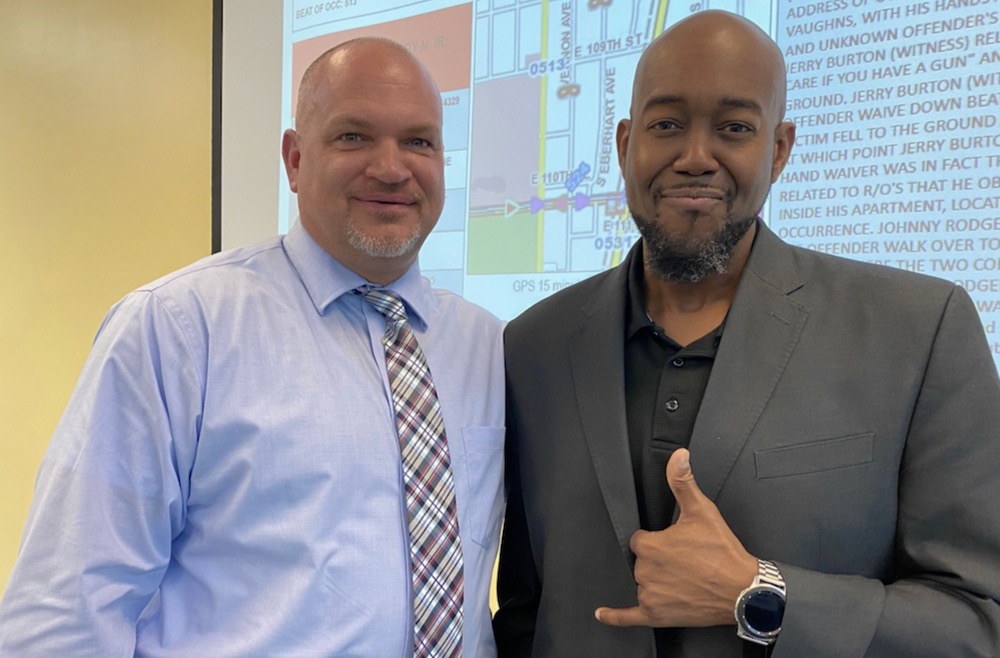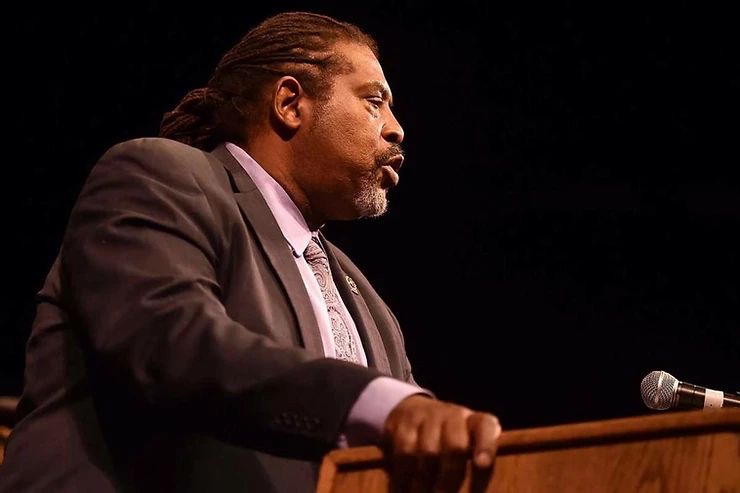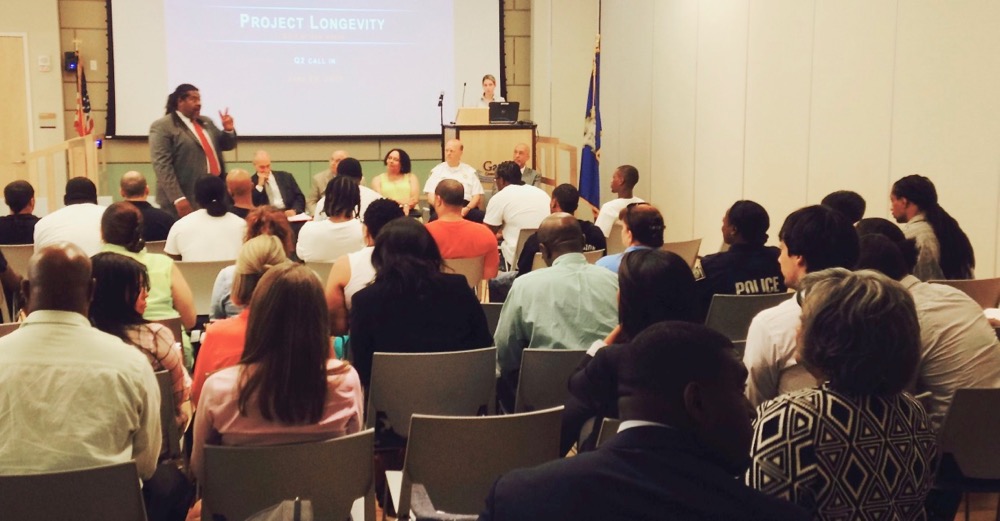As the United States wraps up the recently proclaimed “National Gun Violence Prevention Week,” and marks the 14th National Day of Remembrance for Murder Victims with vigils in the Virgin Islands and across the country, the Source launches a series on a proven strategy deployed in communities across the globe to reduce such violence and save substantial numbers of community members from prison, death and grievous loss of loved ones. As this strategy had a beginning in the U.S. Virgin Islands in 2016, we offer these stories as hope for our community and as a catalyst to revive what was temporarily downed by the storms of 2017.

When New Haven, Connecticut, Assistant Police Chief Karl Jacobson talks about the strategy to reduce gun violence developed by David Kennedy of the National Network for Safe Communities his passion overflows.
“It works,” Jacobson, who has been a cop for 23 years, said in a recent phone interview. But it took him some time to get to that understanding.
New Haven, a city of 129,000 people in 2011, was setting records with 35 homicides and 165 nonfatal shootings under its belt.
The proof of the strategy’s effectiveness is in the numbers.
“Between 2013 and 2019, New Haven has averaged 11 homicides and 65 nonfatal shootings a year,” said Jacobson, who is the chief of detectives.
The U.S. Virgin Islands, with a population of roughly 100,000 has averaged 40 homicides a year during the same time period, ranking by the U.N. and other agencies as number four in the world for homicides per capita and number one in the country. For a longer more detailed tally of how much V.I. homicides have not changed over 20 years, see “Homicide in the Virgin Islands – Young Men Dead On the Street.”
As for nonfatal shootings, the Source was only able to obtain statistics for three full years and partial numbers for 2020, which are: 56 nonfatal shootings in 2017, 34 in 2018, 45 for 2019 and already 53 as of Sept. 27, 2020.
A United Nations Homicide Global Study breaks from such dry statistics, placing homicides into a more human perspective. “The intentional killing of a human being by another is the ultimate crime. Its indisputable physical consequences manifested in the form of a dead body also make it the most categorical and calculable.”
And that is what makes Jacobson elated when he talks about New Haven’s success. They’ve reduced the dead bodies by a dramatic measure.
Jacobson has a slight New York accent and vernacular that makes him sound like a character from the 1990s “NYPD Blue” television series. He said the strategy didn’t much interest him when he first encountered it in 2011. However, he said, once he was introduced – forced in fact by the man who held his position at the time – and schooled through the National Networks training, he became not only open to but excited by the new policing paradigm, which focuses on group violence intervention.
New Haven started the groundwork in 2012, beginning with the data gathering and a process referred to as mapping, which outlines the groups causing the vast majority of the violence. That group is always a startlingly small section of the population.
In the USVI, which began working with National Network for Safe Communities in 2016, after a frustratingly and deadly slow start, it is estimated that 65 people commit 90 percent of the violence. Kennedy and others who have worked with him, including Jacobson, pin it at about 0.1 percent of the population. (That is point one percent, or one-tenth of one percent, to be clear.)
In 2013, Jacobson said New Haven, after collecting the data and coordinating the necessary partners “brought the strategy in.” They began the dynamic, interactive part involving a series of what is referred to as “call ins.” In attendance are group members who have been identified as those causing most of the violence, police officers, community members, NGOs and other government agencies.
Once the partners are assembled, “We say to them [the high-risk individuals], ‘I want you safe, alive and out of jail.’”
Jacobson said, “This approach changes the culture of hating police if they feel you are legitimate.”
“I can honestly say it turned us around,” Jacobson said. “We got a lot of public trust back.”
As proof, he said, when protests broke out across the nation after the George Floyd killing, “We have had one rock thrown breaking a window in New Haven.”
The unintended positive consequence in the current state of racial unrest is due to the years that New Haven has established a whole new relationship between the community and the police, thanks to the new policing policies born of the National Network for Safe Communities strategies.
There is only one goal for what is also known as Group Violence Intervention and that is to stop the shootings. A side benefit can be access to vocational training, mental health services, job placement and other support services to help those called in to turn their lives around.
But Jacobson echoed what Kennedy has said in several personal conversations with this reporter; very few of those “called” actually take advantage of some of the offers of help. Nonetheless, city after city where GVI has operated has experienced dramatic decreases in homicides and gunshots.
Sadly, he noted, there are the cities where the strategy never got off the ground. He said the failures are fully upon the police departments not willing to move out of the old and failed policing methodology.
“I was even against it,” he said, because the strategy includes letting the target group know they are being watched, which goes against the grain of old-time policing, based on the surprise factor, “So, now I am supposed to warn them?”
It was a hard pill to swallow until he saw the results for himself. But he reinforced repeatedly, it won’t work without strong leadership, as he had with former Assistant Chief Archie Generoso.
“He … made me do it,” Jacobson said. “We would argue, and he would say, ‘Just do it.’”
And as the department continued to do it, the number of shootings continued to go down.
And therein lies the failure of the other two large cities in Connecticut, Jacobson said. The leadership required to force police officers to change their ways wasn’t there. And without that, there was no incentive for officers to consider a new way of doing things.
Kennedy echoes Jacobson’s take on why the strategy doesn’t work in some places. “You say to them, here’s what works … but they can’t hold onto it. It takes an ongoing commitment,” he said in a conversation in August. The other sure-fire formula for failure is political posturing, or “fighting over who gets credit,” Kennedy said.

Ongoing Commitment
The ongoing commitment piece has contributed to New Haven’s success. Called Project Longevity, retired police officer Stacy Spell has been on board as a project manager since 2014.
Kennedy told this reporter that he has never felt law enforcement officers were the right fit for project managers. Spell said because of that, the first project manager was a clergyman.
“It didn’t work out,” so when the position opened up in the second year of the implementation, he applied for the job.
Kennedy has made an exception in his rule, where Spell is concerned.
However, it is important to note, Spell was already operating as a community-based advocate in New Haven. Where most often a manger comes from the private or nonprofit sector, Spell had the skills and experience of all three: law enforcement, community member and nonprofit volunteer.
A retired police officer, he said he watched as “bodies were dropping,” all around him. He looked around for someone to “stand with” him but soon saw, “I stood by myself.” “So,” he said in a recent interview, “I strapped on Mrs. Spell, [his Glock] and went to where the homicides were happening and started playing chess.”

Spell taught youngsters in West River, a New Haven neighborhood, to play the game. That seemingly small effort, he said, produced immediate results.
“Overnight the violence dropped.”
Project Longevity, New Haven’s permutation of the National Network for Safe Communities strategy, is about empowering the community. “Previously, people had no say in how they were policed,” Spell said.
His experience of the GVI results have left him a “loud” advocate of the strategy
“To hell with the rhetoric,” he said. “You have to show up; you have to court people.”
One of the ways Project Longevity shows up is with simple things. The community partners, along with police, provide things like diapers, a pair of sneakers or groceries. In exchange, Spell said, “We only ask you to change your life.”
In New Haven, it is often the police who check in with community members regularly to make sure they have food and other life support. In other areas that job falls to the community partner – the nonprofits and other NGOs.
In conversations, Kennedy has reinforced Spell’s experience.
“These individuals want what everyone wants; to be able to feed their families and pay their utility bills,” he said.
Unfortunately, the target population is seldom seen that way in the community.
As Jacobson said, the required change of mentality – especially in the ranks of traditional policing – is not an easy sell, which is why both Jacobson and Spell said the strategy had failed miserably in other cities and jurisdictions.
“You have to have buy-in,” Spell said. But once you do, and it doesn’t take huge numbers, the results are undeniable. He said in 2017, New Haven had seven homicides and 34 nonfatal shootings, below even the average of the six years between 2013 and 2019 quoted earlier by Jacobson.
Both Jacobson and Spell have taken their success on the road, even overseas. Both have provided presentations along with their passion to other law enforcement and community organizers.
“Karl has even gone [to] other countries,” Spell said. And Jacobson recounted the thrill he experienced in being able to offer New Haven’s strategies and success to a contingent from Sweden a few years ago.
A report issued in 2019 by the Giffords Law Center relative to the success of Oakland, California, in reducing gun violence by nearly 50 percent since 2012, spoke to the side benefits of what was referred to in the report as Ceasefire – another name for the National Network’s strategy.
“As a report by the National Institute for Criminal Justice Reform states, the result was that “OPD’s [Oakland Police Department’s] proactive units spend far less time doing unfocused, area-based enforcement with low-risk individuals, and a much greater amount of time understanding the current violence dynamic and focusing on the very small number of individuals driving that violence.”
The Ceasefire section has become institutionalized as an integral part of the Oakland Police Department’s response to violent crime.
The report entitled “A Case Study in Hope” echoes what Jacobson, Spell and Kennedy repeated, “To properly execute a strategy like Oakland Ceasefire, law enforcement partners have to come to the table ready to try new approaches and willing to partner with impacted communities.”
Editor’s note: New Haven and Oakland are only two of the many communities that have successfully employed the GVI strategy.





